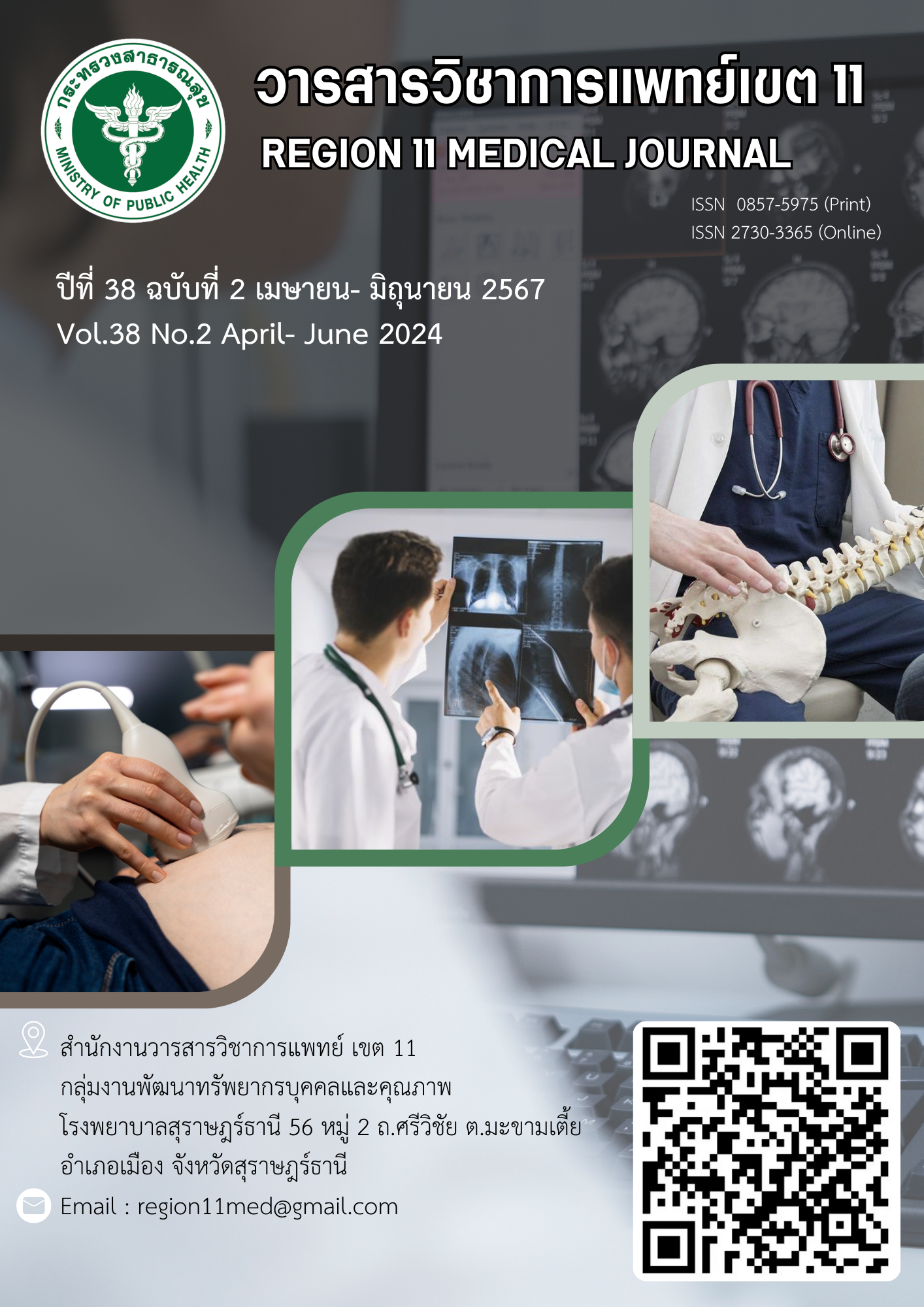ผลของโปรแกรมส่งเสริมการรับรู้สมรรถนะแห่งตนต่อพฤติกรรมการจัดการตนเองของผู้ป่วยโรคไตเรื้อรัง ระยะที่ 3 ในสถานบริการระดับปฐมภูมิเครือข่ายโรงพยาบาลสุราษฎร์ธานี
คำสำคัญ:
โปรแกรมส่งเสริมการรับรู้สมรรถนะแห่งตน, พฤติกรรมการจัดการตนเอง, โรคไตเรื้อรังระยะที่ 3บทคัดย่อ
ที่มา: โรคไตเรื้อรัง เป็นปัญหาสาธารณสุขระดับโลกที่ทุกประเทศกำลังเผชิญและกำลังมีแนวโน้มเพิ่มมากขึ้นทั่วโลก เป็นโรคที่รักษาไม่หายขาด จำเป็นต้องรับการรักษาอย่างต่อเนื่องและมีค่าใช้จ่ายในการรักษาสูง
วัตถุประสงค์: เพื่อศึกษาผลของโปรแกรมส่งเสริมการรับรู้สมรรถนะแห่งตนต่อพฤติกรรมการจัดการตนเองของผู้ป่วยโรคไตเรื้อรัง ระยะที่ 3 ในสถานบริการระดับปฐมภูมิเครือข่ายโรงพยาบาลสุราษฎร์ธานี
วิธีการศึกษา: กลุ่มตัวอย่าง คือ ผู้ป่วยโรคเรื้อรัง ระยะที่ 3 ในสถานบริการระดับปฐมภูมิเครือข่ายโรงพยาบาลสุราษฎร์ธานี มีผลตรวจอัตราการกรองไตร้อยละ 45 – 60 ในระยะ 6 เดือนก่อนเข้าร่วมโครงการวิจัย สุ่มเลือกกลุ่มตัวอย่างโดยใช้วิธีหยิบฉลาก กำหนดขนาดกลุ่มตัวอย่างจากการคำนวณค่าอิทธิพล (Effect size) มีค่าเท่ากับ .70 กำหนดค่าระดับนัยสำคัญทางสถิติที่ .05 ค่าอำนาจการทดสอบที่ .80 เปิดตาราง ของ Cohen ได้ขนาดตัวอย่างกลุ่มละอย่างน้อย 25 ราย สถิติวิเคราะห์ เปรียบเทียบข้อมูลโดยใช้ independent t-test
ผลการศึกษา: พฤติกรรมการจัดการตนเอง ความรู้ในการจัดการตนเอง อัตราการกรองของไต (GFR) และค่าครีอะตินิน (Cr) หลังได้รับโปรแกรม พบว่า พฤติกรรมการจัดการตนเอง และความรู้ในการจัดการตนเอง ของกลุ่มทดลองมีค่าคะแนนเฉลี่ยสูงกว่ากลุ่มควบคุม ค่าครีอะตินิน ของกลุ่มทดลองต่ำกว่ากลุ่มควบคุม และค่าอัตราการกรองของไตสูงกว่ากลุ่มควบคุมอย่างมีนัยสำคัญทางสถิติ (p<.05)
สรุป: โปรแกรมส่งเสริมการรับรู้สมรรถนะแห่งตนต่อพฤติกรรมการจัดการตนเองของผู้ป่วยโรคไตเรื้อรังระยะที่ 3 สามารถเพิ่มความรู้ และปรับเปลี่ยนพฤติกรรมการจัดการตนเอง และนำไปสู่การทำงานของไตในผู้ป่วยโรคไตระยะที่ 3 ได้
เอกสารอ้างอิง
Carney E.F. The impact of chronic kidney disease on global health. Nat. Rev. Nephrol. 2020; 16:251. doi: 10.1038/s41581-020-0268-7
Nephrology Society of Thailand. Guidelines for kidney diseases. Bangkok: BNS Advance; 2016.
Tsai M.H., Hsu C.Y., Lin M.Y., Yen M.F., Chen H.H., Chiu Y.H., Hwang S.J. Incidence, Prevalence, and Duration of Chronic Kidney Disease in Taiwan: Results from a Community-Based Screening Program of 106,094 Individuals. Nephron. 2018; 140:175–184. doi: 10.1159/000491708
ศิวิไล โพธิ์ชัย, จินตนา กิ่งแก้ว และณกานดา ยมศรีเคน. พฤติกรรมการจัดการตนเองของผู้ป่วยโรคไตเรื้อรังที่ไม่ได้รักษาด้วยการฟอกไตระยะที่ 1–4 ในตำบลโพธิ์ ตำบลหนองแก้ว ตำบลโพนเขวา อำเภอเมือง จังหวัดศรีสะเกษ วารสาร โรงพยาบาลสกลนคร. 2022; 25(3):49-57.
วันวิสาข์ สนใจ, สุวรรณา จันทร์ประเสริฐ และนิสากร กรุงไกรเพชร. ผลของการจัดการตนเองต่อพฤติกรรมสุขภาพและสมรรถภาพไตของผู้ป่วยโรคเรื้อรังที่มีภาวะไตเสียหน้าที่ระยะที่ 2 วารสารวิจัยทางวิทยาศาสตร์สุขภาพ. 2018; 12(2):88-97.
ศศิพิมพ์ ไพโรจน์กิตระกูล, ธีรนุช ห้านิรัติศัย และศุภชัย ฐิติอาชากุล. ผลของโปรแกรมการส่งเสริมการดูแลร่วมกันต่อการดูแลร่วมกันของผู้ป่วยและครอบครัวภาวะโภชนาการ และการติดเชื้อที่แผลช่องสายออกในผู้ป่วยล้างไตทางหน้าท้องแบบต่อเนื่อง รามาธิบดีพยาบาลสาร. 2557; 20(3):325-340.
วนิดา อินรัสพงศ์. ประสิทธิผลของโปรแกรมการส่งเสริมการรับรู้สมรรถนะตนเองของผู้ป่วยโรคไม่ติดต่อเรื้อรังที่มีภาวะไตเรื้อรังระยะ 3 และ 4 ในอำเภอศรีรัตนะ จังหวัดศรีสะเกษ. วารสารคุ้มครองผู้บริโภคด้านสุขภาพ (online). 2556; 3(2):50-62.
Lai PC, Wu SV, Alizargar J, Pranata S, Tsai JM, Hsieh NC. Factors Influencing Self-Efficacy and Self-Management among Patients with Pre-End-Stage Renal Disease (Pre-ESRD). Healthcare (Basel). 2021; 9(3):266. doi: 10.3390/healthcare9030266
Wu S.F.V., Lee M.C., Hsieh N.C., Lu K.C., Tseng H.L., Lin L.J. Effectiveness of an innovative self-management intervention on the physiology, psychology, and management of patients with pre-end-stage renal disease in Taiwan: A randomized, controlled trial. Jpn. J. Nurs. Sci. 2018; 15:272–284. doi: 10.1111/jjns.12198
กังสดาล หาญไพบูลย์ และชญานินท์ ประทุมสูตร. ปัจจัยที่มีผลต่อพฤติกรรมสุขภาพเพื่อชะลอไตเสื่อมของผู้ป่วยโรคไตเรื้อรังระยะที่ 3 - 4 โรงพยาบาลคลองขลุง จังหวัดกำแพงเพชร. วารสารไทยเภสัชศาสตร์และวิทยาศาสตร์สุขภาพ. 2562; 14(2):53-61.
จุฑามาส พรมใจมั่น. ผลของโปรแกรมการจัดการตนเองต่อความรู้ พฤติกรรมการจัดการตนเองและการเกิดเยื่อบุช่องท้องอักเสบในผู้ป่วยโรคไตเรื้อรังที่ได้รับการล้างไตทางช่องท้อง (วิทยานิพนธ์หลักสูตรพยาบาลศาสตรมหาบัณฑิต) บัณฑิตวิทยาลัย มหาวิทยาลัยคริสเตียน. 2563.
ทิพย์ ลือชัย, พิกุล พรพิบูลย์ และชมพูนุท ศรีรัตน์ (2565) ผลของโปรแกรมการเสริมสร้างสมรรถนะแห่งตนต่อพฤติกรรมการควบคุมโรค น้ำหนักที่เพิ่มขึ้นระหว่างรอบของการฟอกเลือดและความดันโลหิตก่อนการฟอกเลือดในผู้ที่ได้รับการฟอกเลือดด้วยเครื่องไตเทียม พยาบาลสาร. 2565; 49(4): 140-150.
ดาวน์โหลด
เผยแพร่แล้ว
รูปแบบการอ้างอิง
ฉบับ
ประเภทบทความ
สัญญาอนุญาต
ลิขสิทธิ์ (c) 2024 วารสารวิชาการแพทย์เขต 11

อนุญาตภายใต้เงื่อนไข Creative Commons Attribution-NonCommercial-NoDerivatives 4.0 International License.






